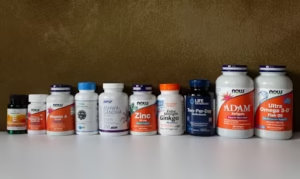Bipolar disorder for best supplements and health, Living with bipolar disorder isn’t a walk in the park—it’s a constant balance of highs and lows. While medication and therapy are the foundation of treatment, many people look toward natural supplements to ease symptoms, improve overall well-being, and reduce mood swings. But which ones work? And more importantly, are they safe?
Let’s dive into the most effective and well-researched supplements that could make a real difference for someone with bipolar disorder.
What is Bipolar Disorder?
Bipolar disorder is a mental health condition marked by extreme mood swings that include emotional highs (mania or hypomania) and lows (depression). These shifts are more than the everyday ups and downs—they can affect sleep, energy, judgment, and daily functioning.
Types of Bipolar Disorder
-
Bipolar I: Severe manic episodes that may require hospitalization.
-
Bipolar II: Hypomanic episodes alternating with major depression.
-
Cyclothymia: Milder mood swings that last longer.
-
Other Types: Triggered by medication, substance use, or medical conditions.
Common Symptoms
-
Euphoric or irritable mood
-
Racing thoughts
-
Excess energy or fatigue
-
Sleep disturbances
-
Trouble concentrating
-
Impulsivity or risky behavior
Why Consider Supplements for Bipolar Disorder?
Role of Nutrition in Mental Health
Your brain is like a high-performance car. Feed it junk, and it sputters. Give it premium fuel—vitamins, minerals, fatty acids—and it purrs. Supplements help fill the nutritional gaps that can impact mental health.
Benefits of Supplements as Adjuncts
Supplements aren’t magic pills. But as adjuncts to prescribed medications and therapy, they can:
-
Support brain chemistry
-
Stabilize mood swings
-
Reduce side effects from medications
-
Improve overall well-being
Warning: Supplements Are Not Replacements for Medications
Let’s be clear—don’t ditch your meds unless your doctor says so. Supplements are just one piece of the puzzle, not the whole picture.
Best Supplements for Bipolar Disorder
Omega-3 Fatty Acids
How Omega-3s Support Brain Function
Found in fish oil, omega-3s (EPA and DHA) are anti-inflammatory fats that boost mood, reduce depression, and may even help regulate mania.
Recommended Dosage and Forms
-
2,000–3,000 mg of EPA + DHA daily
-
Choose high-purity fish oil or algae-based options (for vegans)
Magnesium
Magnesium’s Role in Mood Stabilization
This calming mineral helps regulate neurotransmitters and may reduce manic symptoms and agitation.
Best Forms and Dosing Considerations
-
Magnesium glycinate or taurate (gentler on the stomach)
-
200–400 mg daily (consult your doctor)

N-Acetylcysteine (NAC)
How NAC Affects Mood and Behavior
Originally used for detox, NAC boosts glutathione, the brain’s master antioxidant. It’s been shown to help reduce bipolar depression and impulsivity.
Dosage and Safety Profile
-
1,000–2,400 mg/day
-
Generally safe, but can cause GI issues in some
Vitamin D
Link Between Vitamin D and Depression
Low levels of the “sunshine vitamin” are linked to seasonal affective symptoms and depression in bipolar individuals.
Seasonal Affective Symptoms in Bipolar Disorder
-
Aim for 2,000–5,000 IU daily (based on blood test)
-
Best absorbed with fat-containing meals
B Vitamins (Especially B6, B9, B12)
Homocysteine Levels and Mood
These B vitamins help regulate homocysteine, which, if elevated, can increase depression and cognitive decline. Bipolar disorder for the best supplements and health,
B Vitamins for Brain and Nerve Health
-
Look for methylated forms (e.g., methylfolate, methylcobalamin)
-
A daily B-complex supplement can cover all bases
Probiotics and Gut Health
The Gut-Brain Connection
Your gut makes about 90% of your serotonin, the feel-good chemical. A happy gut = a more stable mood.
Recommended Probiotic Strains
-
Lactobacillus rhamnosus
-
Bifidobacterium longum
-
Take with prebiotic fiber for extra benefit
Zinc
Zinc and Neurotransmitter Regulation
This trace mineral helps regulate the levels of dopamine and serotonin, both of which are crucial for maintaining mood stability.
Low Zinc Levels and Mood Disorders
-
Recommended dosage: 15–30 mg daily
-
Avoid going overboard—too much can block copper
L-Theanine
Calming Effects Without Drowsiness
Found in green tea, L-theanine promotes alpha brain waves—those “relaxed alert” states. Great for anxiety during manic episodes.
Ideal for Anxiety Episodes
-
100–200 mg as needed
-
Works well with caffeine (balances jitters)
SAMe (S-Adenosylmethionine)
Caution with Mania Risk
Powerful for depression, but may trigger mania in some people with bipolar. Only use under medical supervision.
SAMe for Bipolar Depression
-
200–800 mg daily, preferably with B vitamins
CoQ10
Mitochondrial Support and Mood
This antioxidant supports cellular energy and may reduce cognitive fatigue and mood instability.
Benefits of Cognitive Fatigue
-
100–300 mg daily
-
Especially helpful if you feel mentally drained
Supplements to Avoid or Use with Caution
St. John’s Wort
Popular for depression, but can cause dangerous interactions with medications and may trigger mania.
Ginseng
Stimulating and unpredictable—could intensify manic symptoms.
Melatonin in Some Cases
Helpful for sleep, but might destabilize mood cycles in some individuals.
Tips for Choosing High-Quality Supplements
Look for Third-Party Testing
Certifications like USP, NSF, or ConsumerLab ensure purity and potency.
Avoid Fillers and Artificial Additives
Stay away from supplements loaded with colorants, binders, and sugar.
Talk to a Doctor or Psychiatrist First
Seriously, always. Interactions with medications can be risky.
Lifestyle Factors That Complement Supplement Use
Diet and Nutrition
Whole foods, omega-3s, fiber, and low sugar can stabilize your mood better than any pill.
Sleep Hygiene
Stick to a routine. Avoid screens before bed. Poor sleep = mood chaos.
Exercise and Stress Management
Even a brisk walk or gentle yoga can reduce cortisol and stabilize your system.

Conclusion
There’s no one-size-fits-all supplement for bipolar disorder, but certain nutrients like omega-3s, magnesium, NAC, and B vitamins show real promise. The key is balance. Don’t expect a miracle cure, but do expect better days when you combine smart supplement choices with professional medical care and a healthy lifestyle. Bipolar disorder for the best supplements and health.
FAQs
1. Can supplements replace bipolar medication?
No, supplements should only be used in conjunction with prescribed medications, not as a replacement.
2. How long do supplements take to work for bipolar symptoms?
Most supplements need 4–8 weeks of consistent use to show results.
3. Are there any natural mood stabilizers for bipolar disorder?
Omega-3s, magnesium, and NAC are some of the most studied natural mood stabilizers.
4. Do supplements interfere with bipolar medication?
Some can. That’s why it’s crucial to consult your psychiatrist before starting anything new.
5. Should I take all these supplements together?
No. Start with one or two, monitor effects, and build from there with your doctor’s guidance.

